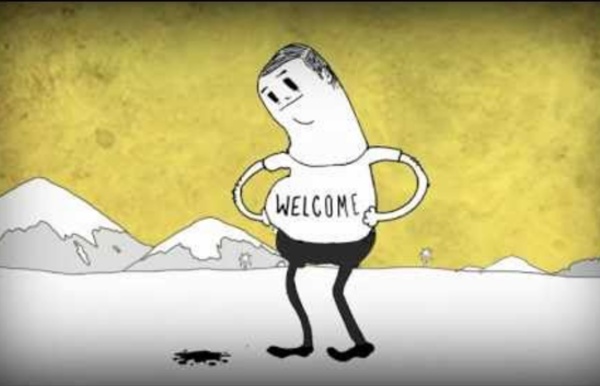



http://www.youtube.com/watch?v=1lhXbu_9qOM
Related: Let's Save the Planet • A TRIER • 15-Quentin V et Marie RSaving the Earth - Recycling [ Randall created this listening activity on saving the environment in 1999, featuring his daughter, Aubrey. She has appeared in many conversations on this site, including another one on saving the planet called, "Water Conservation," produced in December 2016. ] Name the three most important environmental issues today and propose solutions for each, including recycling. Environnement. L’humanité ronge la planète À partir de ce mercredi 2 août, l’humanité vit “à crédit” jusqu’au 31 décembre, c’est-à-dire qu’elle a épuisé toutes les ressources que la planète peut renouveler en un an. C’est l’ONG Global Footprint Network qui procède à ce calcul depuis 1986, à partir notamment de l’empreinte carbone, des ressources consommées par la pêche, l’élevage, les cultures, la construction ainsi que de l’utilisation d’eau. Ce “jour du dépassement” survient de plus en plus tôt chaque année, souligne The Independent, rappelant que dans les années 1980 il se situait au mois de novembre. À ce niveau de consommation des ressources, l’humanité aurait besoin d’1,7 planète pour subvenir à ses besoins.
Top 10: climate change campaigns When it comes to climate change adverts, we’ve seen everything from melting polar bears to electricity conscious orangutans. But which ones really stood out from the rest? Campaigns by 350 and Liberate Tate proved popular among our readers and followers, so here’s the full top 10 as decided by you:
A Greener World [ Quiz Script ] First, name three environmental problems that face our world today, how people can help solve these problems. What image comes to your mind when you think of "recycling"? Listen to the conversation by pressing the "Play" button of the audio type you want to hear, and answer the questions. Press the "Final Score" button to check your quiz. Listen to the conversation again as you read the Quiz Script.
8. Coup d’envoi de la COP25 à Madrid, Antonio Guterres veut écouter les jeunes militants Devant les représentants des quelque 200 pays signataires de l'accord de Paris, dont une quarantaine de chefs d'Etat et de gouvernement, le secrétaire général de l'ONU Antonio Guterres a lancé le coup d'envoi de la COP25 à Madrid. L'Humanité, qui subit les conséquences du dérèglement climatique, doit choisir entre l'"espoir" d'un monde meilleur en agissant ou la "capitulation", a déclaré lundi Antonio Guterres à l'ouverture de la COP25 à Madrid. Le monde est à un "tournant" et "d'ici la fin la prochaine décennie, nous serons sur un de ces deux chemins.
Global warming could create 150 million 'climate refugees' by 2050 Global warming will force up to 150 million "climate refugees" to move to other countries in the next 40 years, a new report from the Environmental Justice Foundation (EJF) warns. In 2008 alone, more than 20 million people were displaced by climate-related natural disasters, including 800,000 people by cyclone Nargis in Asia, and almost 80,000 by heavy floods and rains in Brazil, the NGO said. President Mohamed Nasheed of the Maldives, who presented testimony to the EJF, said people in his country did not want to "trade a paradise for a climate refugee camp". He warned rich countries taking part in UN climate talks this week in Barcelona "not to be stupid" in negotiating a climate treaty in Copenhagen this December. Nasheed urged governments to find ways to keep temperature rises caused by warming under 2C.
50 easy ways to save the planet 1 Wrap gifts in fabric and tie with ribbon; both are reusable and prettier than paper and sticky-tape. 2 Start a compost heap to reduce the waste you send to landfill sites. 3 Buy your own hive: without bees the planet would last for only 60 years (and honey is good for your health). 10. COP25 : d'après l'ONU, c'est notre dernière chance Quatre ans après l'Accord de Paris, les États se réunissent à nouveau lors de la COP25 qui se déroule à Madrid du 2 au 13 décembre. Cette année, l'ONU a été extrêmement claire. Au vu de l'avancement du dérèglement climatique et de l'effondrement de la biodiversité, c'est notre dernière chance d'agir réellement. Si l'on manque le coche, les efforts à fournir pour rattraper notre retard risquent d'être... insurmontables.
It’s Not Your Imagination. Summers Are Getting Hotter. - The New York Times Summer temperatures in the Northern Hemisphere Extraordinarily hot summers — the kind that were virtually unheard-of in the 1950s — have become commonplace. This year’s scorching summer events, like heat waves rolling through southern Europe and temperatures nearing 130 degrees Fahrenheit in Pakistan, are part of this broader trend. The chart above, based on data from James Hansen, a retired NASA climate scientist and professor at Columbia University, shows how summer temperatures have shifted toward more extreme heat over the past several decades. To create the bell curves, Dr.
Greta Thunberg and George Monbiot on the climate crisis This is not a drill. My name is Greta Thunberg. We are living in the beginning of a mass extinction. Our climate is breaking down. Children like me are giving up their education to protest. But we can still fix this. 9. Déchets plastiques : la dangereuse illusion du tout-recyclage En juillet dernier, le gouvernement présentait son plan climat ; parmi les mesures, un objectif de « 100 % des plastiques recyclés à l’horizon 2025 ». La France, avant-dernière des 28 pays de l’Union européenne en matière de recyclage du plastique, est pressée d’améliorer son piteux classement. Dans le même temps, la Chine, première terre d’accueil de nos détritus plastiques, ferme ses frontières aux déchets étrangers. Des vortex géants de plastiques s’installent au cœur de nos océans et, comble de malheur, d’invisibles particules de déchets plastiques s’invitent, c’est officiel, dans nos assiettes. Une question se pose dans un tel contexte : le recyclage intensif de ces déchets constitue-t-il vraiment une étape incontournable du déploiement de l’économie circulaire ?